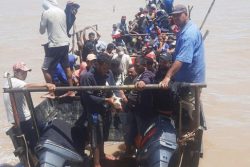Over two years after their exit from Guyana due to the COVID-19 pandemic, United States Peace Corps volunteers have returned and 18 persons making up the 33rd cohort were on Wednesday sworn in to start giving support in communities across the country.
A former Peace Corps volunteer herself, United States Ambassador Sarah-Ann Lynch urged the new volunteers to make both countries proud of their service here.
She reflected on her own two years volunteering and the experience she had in Morocco as an English teacher at age 22. Lynch said that in her giving back for the people of the United States, she also gained new skills, a wealth of experience and indelible memories. Learning Arabic was also a gain for her, she pointed out.
The US Envoy’s brother and niece are also proud Peace Corps volunteers.
The Peace Corps was first active in Guyana from 1966-1971. In 1993, it was invited to return to Guyana by the late President Dr Cheddi Jagan and the first group arrived in 1995.
Minister of Parliamentary Affairs Gail Teixeira was singled out by the Peace Corps for assisting in their return as she consistently lobbied and ensured necessary government requirements were in place.
For her part, Teixeira lauded the work of the organisation and by extension the United States government as she pointed to the long history of its assistance here.
Teixeira, who held the portfolio of Minister of Health in the past, reflected on the help given by the Peace Corps when Guyana was faced with a Cholera breakout back in the 1990s.
She said that while to some persons it might not have meant a lot, to her the Peace Corps was integral in the health ministry’s work, especially the hinterland regions, where they taught the importance and health benefits of proper sanitation. In that way, she said, they helped so that “The children in our schools became our main advocates at home …to get not only that [cholera] eliminated but other gastric diseases from our children.”
“The basic things that we sometimes take for granted are the things we need to support at the community level. …They were there and it means a lot for us,” she added.
The Parliamentary Affairs Minister promised the new volunteers that her government will also be there to provide assistance necessary even as she told them to also use some of their spare time to enjoy and explore the beauty of the country
In August 2019, the 32nd Cohort of 29 volunteers was welcomed here and were based in communities across eight of the ten regions of Guyana.
However, in 2020, as fears arose over the novel coronavirus disease outbreak, the Peace Corps announced the temporary suspension of its activities and the withdrawal of its volunteers worldwide.
The Peace Corps had explained that the steps being taken were to safeguard the well-being of the volunteers and to prevent instances whereby some are unable to leave their host countries in light of international travel bans. The Peace Corps is the US government’s service opportunity programme for its citizens and changemakers “to immerse themselves in a community abroad, working side by side with local leaders to tackle the most pressing challenges of our generation.”
It was created by US President John F Kennedy in March 1961 to provide human resource and technical assistance to developing countries on request.
Its objective is “To promote world peace and friendship by fulfilling three goals: To help the people of interested countries in meeting their need for trained men and women. To help promote a better understanding of Americans on the part of the peoples served. To help promote a better understanding of other peoples on the part of Americans.”
The Peace Corps states that it provides rigorous technical training at the start of service, which includes in-depth intercultural and language instruction, usually from a native speaker.
Its website explained “Throughout service, Volunteers have regular opportunities to gain new skills related to work, language, culture, and safety. This training makes returned Peace Corps Volunteers highly in demand by corporate, nonprofit, and government employers seeking candidates with the skills required in today’s global economy.”
“The Peace Corps offers career support specifically tailored to Volunteers when they return home to help them prepare for their next step: Help translating their field experience to prospective employers Advantages in federal employment and hiring benefits related to noncompetitive eligibility and possible credit toward retirement should they meet qualifications Access to job announcements, résumé services, and career fairs. Other special eligibility for hiring preferences by organizations designated as Employers of National Service Returned Peace Corps Volunteers have gone on to successful careers in all kinds of fields, from international development to business to the arts,” it adds.
![US Ambassador Sarah-Ann Lynch, Minister of Parliamentary Affairs Gail Teixeira, Chief Education Officer Saddam Hussein and Georgetown Mayor Ubraj Narine [at extreme right end] along with other officials pose with the group of Peace Corps Volunteers [standing]](https://s1.stabroeknews.com/images/2022/12/Peace-Corps-2023.jpg)







